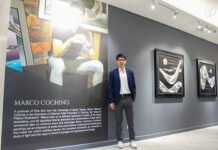UST SINGERS instructor Fidel Gener Calalang stamped his mark once more as a world-class conductor after sitting as the only Filipino jury in the 20th International Festival of Academic Choirs Competition (IFAS) in Pardubice, Czech Republic last July 1 to 8.
“There were many different artistic elements of sounds presented by the choirs, making the competition this year more diverse,” Calalang told the Varsitarian.
Calalang is not new in the business, as this was his second time to be invited as a member of the jury in IFAS. It also helps that the outstanding composer and conductor has been to many prestigious musical events in the world and has received many awards, such as the “best conductor” at the 2002 Tonen International Choral Competition in the Netherlands, and the top prize at the 1999 International Composers Competition in California, United States.
The multi-awarded musician admitted that compared with the contestants in his first stint at the IFAS, this year’s group was more difficult to judge.
“Many of the participants had more refined performances this year,” Calalang said. “It was really hard to tell and decide the best among all the choirs that joined.”
Calalang also compared the Philippines with other chorale groups in the competition.
“There are so many choirs in the world right now and I often wonder how far we have gone through in music,” he said. “Some nations had to showcase only what they got, but Filipinos are flexible; we can sing from broadway to pop, jazz or gospel.”
But apart from the usual criteria in most chorale competitions, he explained that participants should also exhibit technical qualities and showcase sounds produced with clarity and simplicity in their repertoire.
“The repertoire is very important because it is like the menu of a restaurant,” Calalang said. “What is the menu of their performance? How can they satisfy the audience?”
Music has been significant for the people in Pardubice and thus, the idea of proposing and organizing an international competition was widely welcomed in 1967 by the Academic Choir of Pardubice and the University of Pardubice.
The competition is held every two years since its beginning in 1968 and has been one of the largest and most prestigious musical gatherings of academic chorale groups all over the world.
In 1998, because of the overwhelming number of aspiring competitors to participate, the requirements for participation were changed to include only choirs from college-level vocational schools, and groups with at least 75 percent of their members between 18 to 30 years old.
“This festival is not only about competing, this is also a venue for innovation where various new ideas meet to share and create good music,” Calalang said.
Amid the musical scenes and personalities that Calalang has been surrounded with during the competition, he noted that in such environment, perseverance, mastery of art, and patience should be the significant keys for choirs to be able to deliver their best performance.
“A determined preparation results in a wonderful and an ideal performance,” Calalang said.













